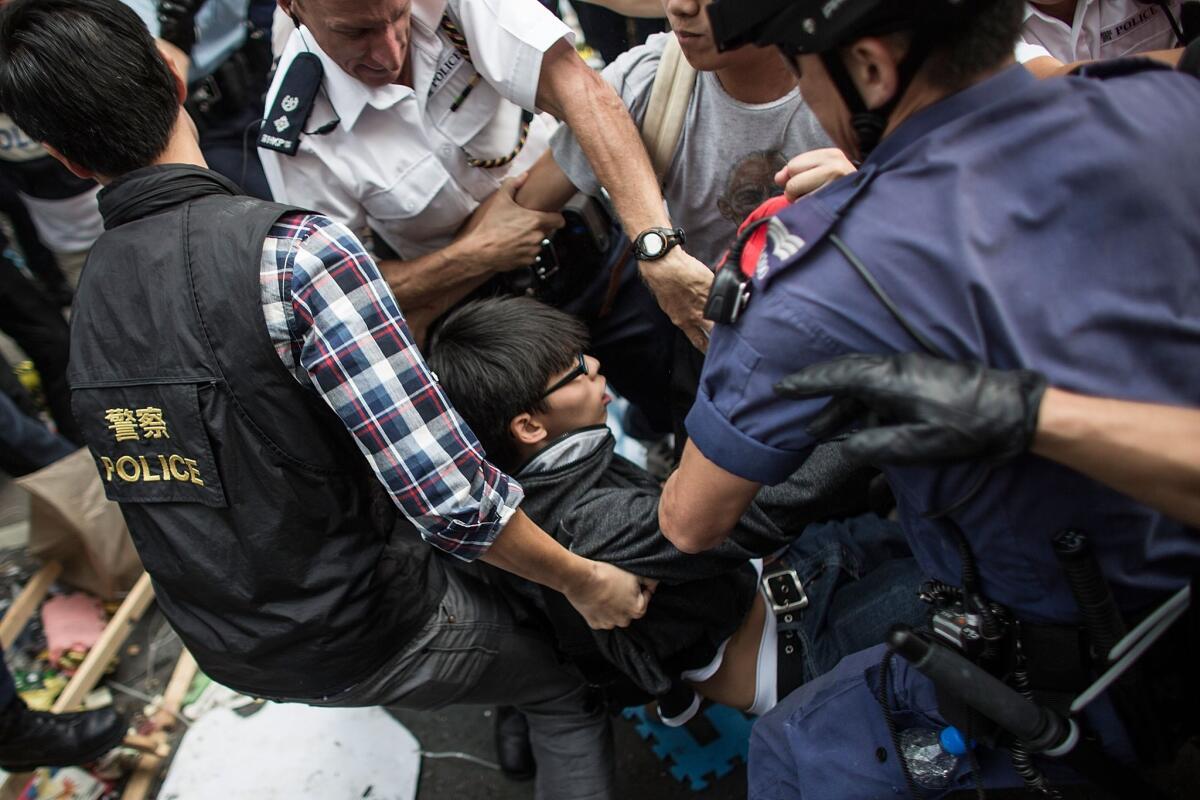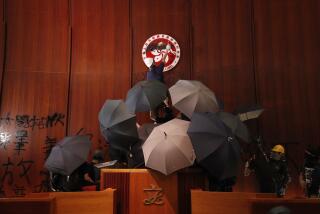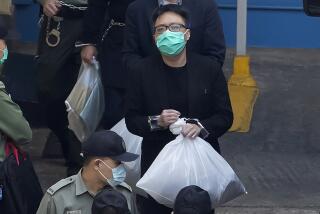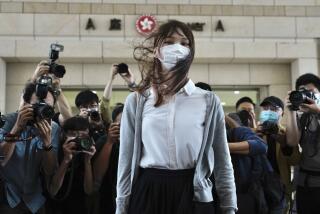Hong Kong student leader banned from protest site, still defiant

Two months ago, police hauled Joshua Wong off a stage after he urged fellow student protesters to storm a plaza inside government headquarters.
The 18-year-old leader of the high school activist group Scholarism had his square-rimmed glasses knocked off in the confrontation that ushered in a pro-democracy movement that continues to beset this former British colony with waves of unrest.
On Thursday, two months to the day since his first arrest, Wong was out on bail after a second clash with authorities Tuesday when he and 160 other protesters were detained on suspicion of obstructing court bailiffs attempting to clear demonstrators’ tents and barricades from the bustling Mong Kok commercial area.
Wong and other student leaders were freed after a court appearance in which they were banned from returning to Mong Kok.
Squinting a bit, as his glasses had again been lost in the commotion of his second arrest, Wong defiantly told fellow students to persevere.
“What we’re fighting for are results,” Wong said, “not retreat.”
When Wong was first arrested, he was held for two days and released only after his attorney, Michael Vidler, intervened. Police raided Wong’s home but never charged him.
Vidler contends that Hong Kong authorities are using arrest as an instrument to control the Occupy pro-democracy demonstrations, which began in late September in demand of the right of local voters to nominate their own candidates for the city’s chief executive in the 2017 election. The protesters say the election framework, issued by authorities in mainland China, restricts their choices to a list of candidates vetted by Beijing’s Communist Party leaders. Hong Kong reverted to Chinese rule 17 years ago.
“His arrest is being used as a vehicle to control the movement,” Vidler, referring to Wong, told reporters outside the court. “He was politically charged.”
The dismantling of the protesters’ camps in Mong Kok was the result of court orders sought by public transportation operators who complained that the obstruction of major thoroughfares had hurt business in the popular shopping district. Police were authorized to arrest and remove demonstrators who interfered with the court-appointed bailiffs.
In its 61st day, the movement has become the longest pro-democracy campaign in modern China. After drawing massive crowds to the streets in September and early October, the protests have diminished substantially in size, though a few thousand demonstrators remain camped in the city’s Admiralty and Causeway Bay neighborhoods.
Even after their camps were dismantled and roadways were reopened in Mong Kok, tension remained high in the area. Demonstrators continued to pour into the neighborhood after school and work despite police warnings against returning.
The police presence remained heavy Thursday night in the shoppers’ haven. Officers warily watched over the crowds and warned students against setting foot there.
City legislator Leung Kwok-hung, a.k.a. Long Hair, who was arrested Tuesday, refused to accept the bail condition to stay away and was held for one more day. Leung finally relented and was freed on bail Thursday evening.
Leung and Wong said they considered the ban on their presence in the entire neighborhood to be unreasonable as their sit-in had taken up only several blocks.
“My rights as a human being and my authority as a legislator have been quashed by the abuse of the due process by the police force,” Leung said.
Law is a special correspondent.
More to Read
Start your day right
Sign up for Essential California for news, features and recommendations from the L.A. Times and beyond in your inbox six days a week.
You may occasionally receive promotional content from the Los Angeles Times.






